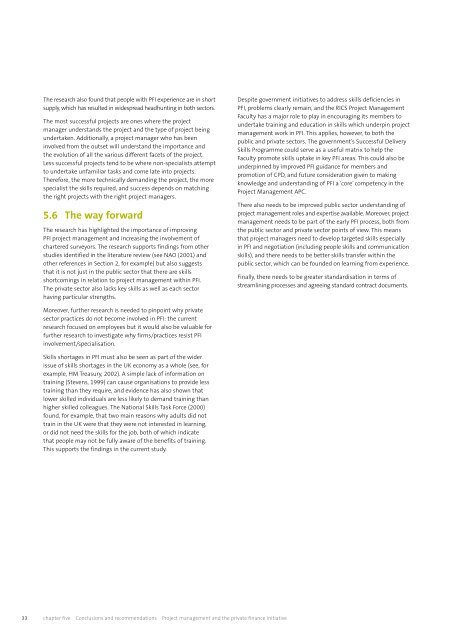Project management and the private finance initiative
Project management and the private finance initiative
Project management and the private finance initiative
You also want an ePaper? Increase the reach of your titles
YUMPU automatically turns print PDFs into web optimized ePapers that Google loves.
The research also found that people with PFI experience are in short<br />
supply, which has resulted in widespread headhunting in both sectors.<br />
The most successful projects are ones where <strong>the</strong> project<br />
manager underst<strong>and</strong>s <strong>the</strong> project <strong>and</strong> <strong>the</strong> type of project being<br />
undertaken. Additionally, a project manager who has been<br />
involved from <strong>the</strong> outset will underst<strong>and</strong> <strong>the</strong> importance <strong>and</strong><br />
<strong>the</strong> evolution of all <strong>the</strong> various different facets of <strong>the</strong> project.<br />
Less successful projects tend to be where non-specialists attempt<br />
to undertake unfamiliar tasks <strong>and</strong> come late into projects.<br />
Therefore, <strong>the</strong> more technically dem<strong>and</strong>ing <strong>the</strong> project, <strong>the</strong> more<br />
specialist <strong>the</strong> skills required, <strong>and</strong> success depends on matching<br />
<strong>the</strong> right projects with <strong>the</strong> right project managers.<br />
5.6 The way forward<br />
The research has highlighted <strong>the</strong> importance of improving<br />
PFI project <strong>management</strong> <strong>and</strong> increasing <strong>the</strong> involvement of<br />
chartered surveyors. The research supports findings from o<strong>the</strong>r<br />
studies identified in <strong>the</strong> literature review (see NAO (2001) <strong>and</strong><br />
o<strong>the</strong>r references in Section 2, for example) but also suggests<br />
that it is not just in <strong>the</strong> public sector that <strong>the</strong>re are skills<br />
shortcomings in relation to project <strong>management</strong> within PFI.<br />
The <strong>private</strong> sector also lacks key skills as well as each sector<br />
having particular strengths.<br />
Moreover, fur<strong>the</strong>r research is needed to pinpoint why <strong>private</strong><br />
sector practices do not become involved in PFI: <strong>the</strong> current<br />
research focused on employees but it would also be valuable for<br />
fur<strong>the</strong>r research to investigate why firms/practices resist PFI<br />
involvement/specialisation.<br />
Skills shortages in PFI must also be seen as part of <strong>the</strong> wider<br />
issue of skills shortages in <strong>the</strong> UK economy as a whole (see, for<br />
example, HM Treasury, 2002). A simple lack of information on<br />
training (Stevens, 1999) can cause organisations to provide less<br />
training than <strong>the</strong>y require, <strong>and</strong> evidence has also shown that<br />
lower skilled individuals are less likely to dem<strong>and</strong> training than<br />
higher skilled colleagues. The National Skills Task Force (2000)<br />
found, for example, that two main reasons why adults did not<br />
train in <strong>the</strong> UK were that <strong>the</strong>y were not interested in learning,<br />
or did not need <strong>the</strong> skills for <strong>the</strong> job, both of which indicate<br />
that people may not be fully aware of <strong>the</strong> benefits of training.<br />
This supports <strong>the</strong> findings in <strong>the</strong> current study.<br />
33 chapter five Conclusions <strong>and</strong> recommendations <strong>Project</strong> <strong>management</strong> <strong>and</strong> <strong>the</strong> <strong>private</strong> <strong>finance</strong> <strong>initiative</strong><br />
Despite government <strong>initiative</strong>s to address skills deficiencies in<br />
PFI, problems clearly remain, <strong>and</strong> <strong>the</strong> RICS <strong>Project</strong> Management<br />
Faculty has a major role to play in encouraging its members to<br />
undertake training <strong>and</strong> education in skills which underpin project<br />
<strong>management</strong> work in PFI. This applies, however, to both <strong>the</strong><br />
public <strong>and</strong> <strong>private</strong> sectors. The government’s Successful Delivery<br />
Skills Programme could serve as a useful matrix to help <strong>the</strong><br />
Faculty promote skills uptake in key PFI areas. This could also be<br />
underpinned by improved PFI guidance for members <strong>and</strong><br />
promotion of CPD, <strong>and</strong> future consideration given to making<br />
knowledge <strong>and</strong> underst<strong>and</strong>ing of PFI a ‘core’ competency in <strong>the</strong><br />
<strong>Project</strong> Management APC.<br />
There also needs to be improved public sector underst<strong>and</strong>ing of<br />
project <strong>management</strong> roles <strong>and</strong> expertise available. Moreover, project<br />
<strong>management</strong> needs to be part of <strong>the</strong> early PFI process, both from<br />
<strong>the</strong> public sector <strong>and</strong> <strong>private</strong> sector points of view. This means<br />
that project managers need to develop targeted skills especially<br />
in PFI <strong>and</strong> negotiation (including people skills <strong>and</strong> communication<br />
skills), <strong>and</strong> <strong>the</strong>re needs to be better skills transfer within <strong>the</strong><br />
public sector, which can be founded on learning from experience.<br />
Finally, <strong>the</strong>re needs to be greater st<strong>and</strong>ardisation in terms of<br />
streamlining processes <strong>and</strong> agreeing st<strong>and</strong>ard contract documents.

















